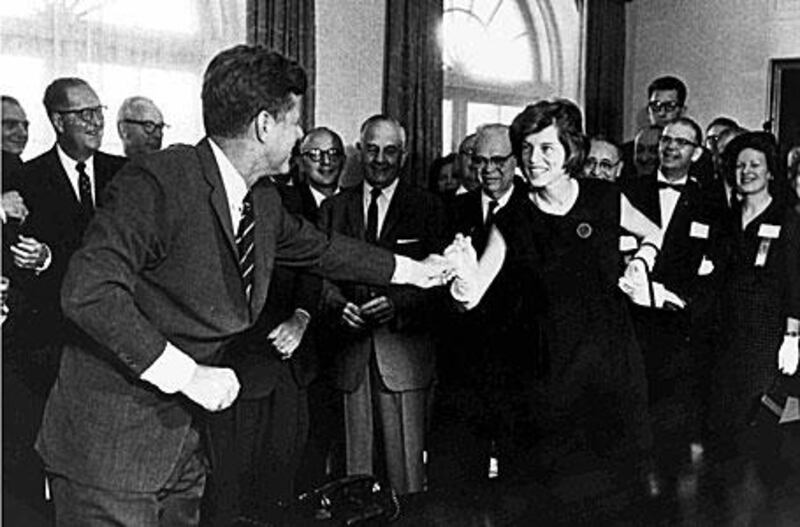Eunice Mary Kennedy Shriver who has died aged 88 did more than anyone in America to challenge common perceptions of the mentally disabled. Determined that the fact of their existence at the very least be discussed in the public at a time when it was unfashionable to do so, she ensured the creation of centres to further the development and treatment of the mentally handicapped and sought the representation of their interests in state legislature.
Her greatest triumph was the conception of the Special Olympics in 1968, which today commands international attention. "Special Olympics athletes are spokespersons for freedom itself," she said. "They ask for the freedom to live, the freedom to belong, the freedom to contribute, the freedom to have a chance. And, of all the values that unite and inspire us to seek a better world, no value holds a higher place than the value of freedom."
The fifth of nine children born to Joseph and Rose Kennedy in 1921, Shriver was particularly close to her eldest sister Rosemary, who had suffered from mild mental retardation since birth. As Rosemary entered adulthood and became increasingly difficult in manner, Joseph Kennedy decided that she should undergo a prefrontal lobotomy. Despite being touted at the time as a miracle surgical cure for neurological problems, the science was still imprecise and the operation left Rosemary badly brain-damaged.
The family hushed up the entire episode until Shriver published a remarkably frank and personal article in The Saturday Evening Post. She wrote of the innumerable men and women hidden away from public sight in institutions where no attempt was made to educate or integrate them into society. The article followed her appeal to her brother John F Kennedy - who entered the White House in 1961 - to initiate a legislative programme to establish centres at major medical schools to study mental health issues.
Shriver studied sociology at Stanford University before becoming a social worker in a women's prison and later working in a shelter and at the Chicago Juvenile Court. In 1953, she married Robert Sargent Shriver Jr, the first director of the Peace Corps, with whom she had five children. In 1962, prompted by a telephone call from a desperate mother seeking a summer camp for her disabled child, Shriver used her considerable personal wealth to host the first Camp Shriver. The grounds of her Maryland home became a haven for children usually excluded from summer camps in the belief that the mentally impaired neither needed, nor had the ability to enjoy, physical activities. Shriver herself leapt into the pool to give swimming lessons and led many of the games based on those she remembered playing with her siblings, including Rosemary, as children.
Six years later in 1968 she inaugurated the first Special Olympics. One thousand athletes from 26 states and Canada attended the games, which were held in Chicago. Three decades later, more than 7,000 international athletes travelled to China to compete at the 2008 World Summer Games in Shanghai. In 1969, she founded the Eunice Kennedy Shriver Centre, a leading centre for research, education and therapy for those with mental disabilities. Of his sister, Senator Edward Kennedy said: "She understood deeply the lesson our mother and father taught us - much is expected of those to whom much has been given. Throughout her extraordinary life, she touched the lives of millions."
In 1984, she received America's highest civilian honour, the Presidential Medal of Freedom. Eunice Mary Kennedy Shriver was born on July 10, 1921. She died on August 11. She is survived by her husband, four sons and her daughter Maria, who is married to Arnold Schwarzenegger, the governor of California. * The National






